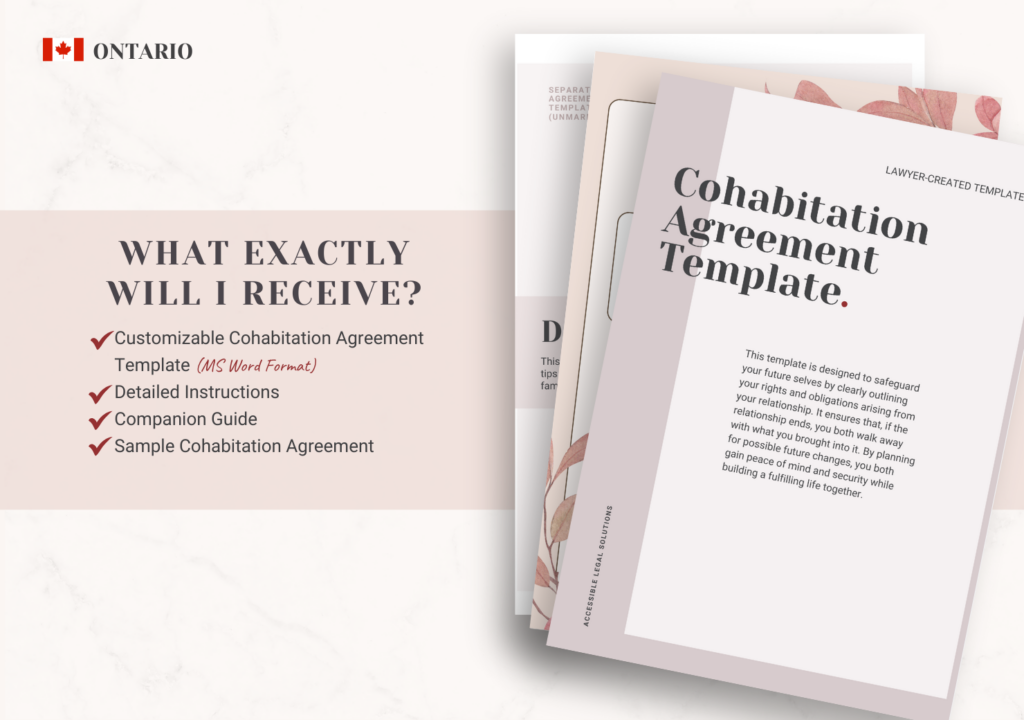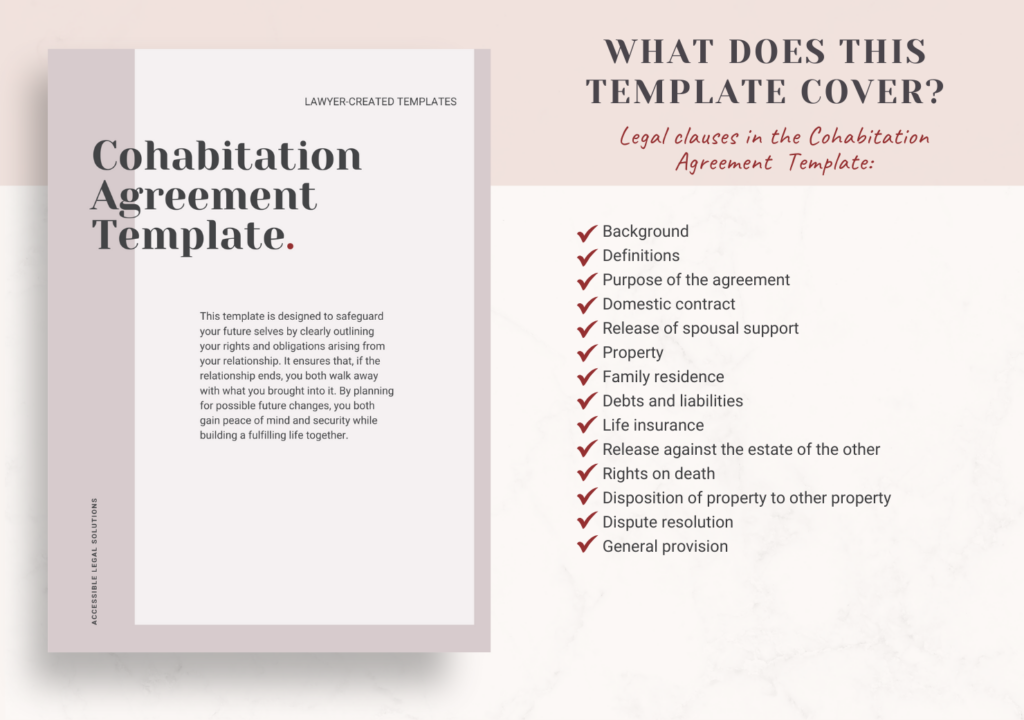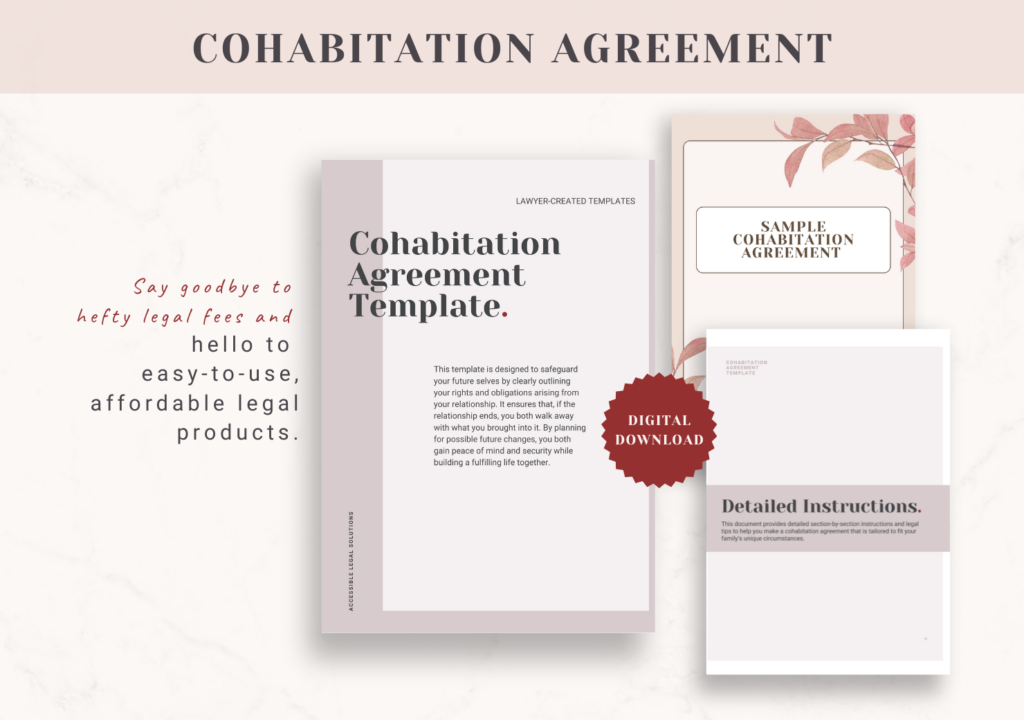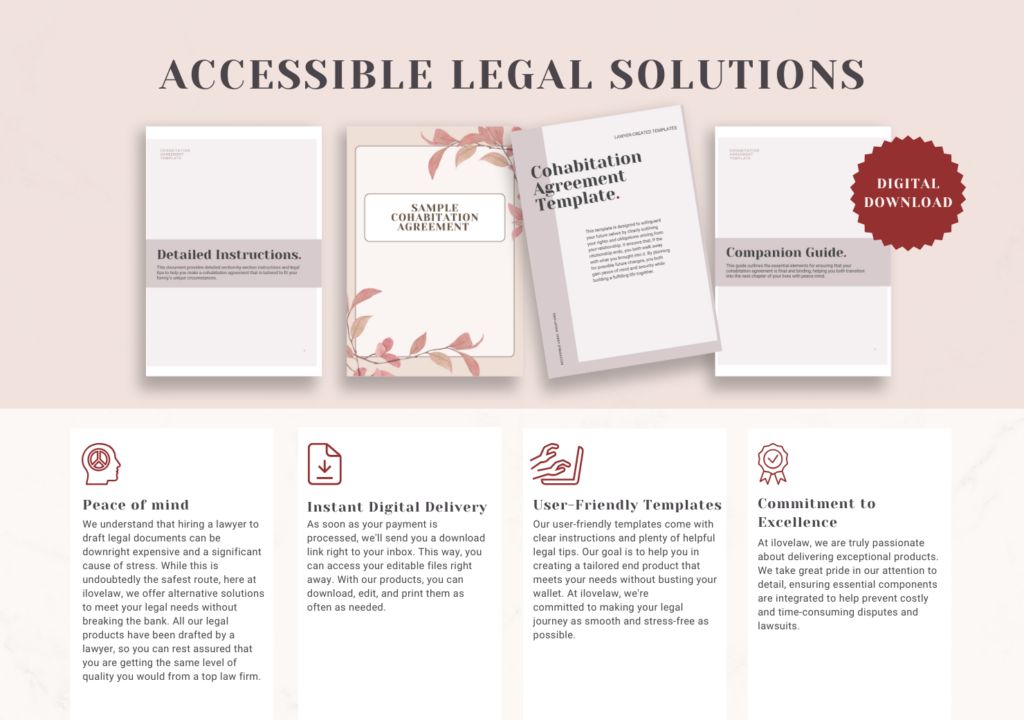Cohabitation Agreement Template
$139.99
Simplify Cohabitation with Clarity and Confidence
Living with someone you love is incredibly rewarding, but it can also bring practical concerns—especially when it comes to protecting your assets. While it might not feel romantic, a cohabitation agreement can provide peace of mind by clearly outlining each partner's rights and responsibilities in the relationship.Why Choose our Template?
Our Cohabitation Agreement Template is designed to help you take control of your future by:- Defining your rights and responsibilities to avoid misunderstandings.
- Protecting your personal assets in case the relationship ends.
- Outlining how assets, debts and finances will be handled during cohabitation, separation or a partner’s death.
- Maintaining financial independence, even in marriage or separation.
- Reducing court involvement by addressing key issues upfront in the event of separation or death.
- Customizing clauses to suit your unique needs.
Build a Cooperative and Stable Future
This agreement lays the foundation for a healthy relationship by reducing uncertainty and empowering you to manage your affairs independently.Start this new chapter with confidence and set your partnership up for success—download our Cohabitation Agreement Template today! Currently, this product is exclusively available in English.$139.99
Legal clauses in this template include:
- Background
- Definitions
- Purpose of the agreement
- Domestic contract
- Release of spousal support
- Property
- Family residence
- Debts and liabilities
- Life insurance
- Release against the estate of the other
- Rights on death
- Disposition of property to the other party
- Dispute resolution
- General provisions
- Customizable Cohabitation Agreement Template (MS Word format)
- Detailed Instructions File
- Companion Guide
- Sample Cohabitation Agreement
This template is a comprehensive, personalized cohabitation agreement for unmarried couples. If you and your partner share similar values regarding your relationship and your finances, a cohabitation agreement can help establish a strong foundation for a happy and harmonious life together.
When to Consult a Lawyer
While this template works for many, certain situations may require legal advice. Consider consulting a lawyer if:
- There is high conflict, a power imbalance, or a history of family violence.
- Either partner struggles with serious mental health or substance abuse issues.
- You do not want to waive your right to property or spousal support in the event of a breakup.
- You own significant assets in Ontario, outside of Ontario, or both.
- You have complex business affairs or substantial business assets, or trust assets.
Unsure if This Template if Right for You?
If you’re uncertain, consider speaking with a lawyer before moving forward. Legal advice ensures your cohabitation agreement fits your family’s unique needs and circumstances. Take the time to feel confident that this document works for you.
Please note: All our legal products are tailored for individuals, families and businesses located in Ontario and are subject to the laws of the province.
This product was last updated in December 2024.
What is a Cohabitation Agreement?
A cohabitation agreement is for couples who live together or plan to do so without marrying. It outlines each partner’s rights and responsibilities, specifically regarding property and finances. This clarity becomes critical if the relationship ends.
Cohabitation agreements are especially helpful when:
- One partner owns a home.
- Both partners plan to buy a home together but do not intend to marry.
These agreements help prevent confusion and protect both parties in the event of a separation.
What is a Prenuptial Agreement?
A prenuptial agreement, or “prenup,” is for couples planning to marry. It defines how property and financial matters will be managed during the marriage, after a separation, or upon a spouse’s death.
Prenups can also include:
- Spousal support details if the marriage ends.
What is a Postnuptial Agreement?
A postnuptial agreement is similar to a prenup but created after marriage. Like a prenup, it clarifies financial responsibilities and property distribution if the couple separates or one spouse passes away.
What Matters Cannot be Covered in These Agreements?
None of these agreements can address family law issues like:
- Parenting time arrangements.
- Decision-making responsibilities for shared children.
These matters are resolved based on the children’s best interests at the time of separation, considering each parent’s ability to support the children’s well-being.
A common-law relationship typically refers to a couple living together in a marriage-like relationship without being legally married. Under Ontario’s Family Law Act, a couple is recognized as common-law partners after they have lived together for three years or have a child together and live in a relationship of some permanence.
In contrast, Canada’s Federal Income Tax Act recognizes common-law partners as “spouses” for tax purposes if the couple has been living together for at least 12 months. The key difference lies in the duration and conditions for recognition. While the Family Law Act emphasizes the relationship’s permanence, the Income Tax Act focuses primarily on the cohabitation period.












Virtual Witnessing Services.
Our Virtual Witnessing Services offer a convenient solution to help ensure your will and power of attorney documents are properly executed, all from the comfort of your home and without the cost or the hassle of visiting a lawyer’s office. Don’t let paperwork stand between you and peace of mind.
You Might
Also Like.
Say goodbye to hefty legal fees and hello to easy-to-use, affordable legal products.



